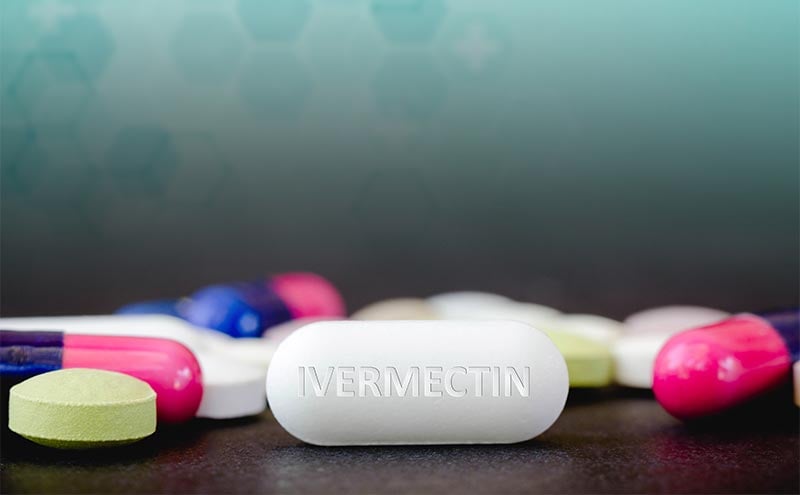
Ivermectin
Background
Ivermectin is an antiparasitic drug that is widely used in veterinary medicine and is also used in humans for the treatment of scabies, onchocerciasis, and strongyloidiasis.(1) It is a member of the avermectin class of drugs, and is the most widely used drug in that class.(2)
It has recently gained notoriety in social media groups as a possible treatment for Covid-19. This is in response to a number of RCTs that were subsequently included in two meta-analyses that purported to show mortality benefit with ivermectin therapy.(3,4) These meta-analyses have been criticized, both on social media and in the literature, for their methodology, inclusion of pre-peer review study data, and reliance in part on a study withdrawn for ethics concerns.(5,6) A meta-analysis by the reputable Cochrane Collaboration was unable to show evidence of benefit.(7) Likely in part due to the social media discussion around ivermectin, reports of toxicity to the National Poison Data System (NPDS) have increased substantially.(8)
Toxicity
Reports of acute toxicity in humans are uncommon. In the aforementioned NPDS bulletin, the vast majority of exposures were listed as minor, no effect, or not followed due to no or minimal effect expected.(9) However, in large overdoses, toxicity may occur. In one case series that analyzed outcomes after avermectin poisoning (most patients with abamectin ingestion); patients with severe poisoning (typically large overdoses) tended to develop profound central nervous system depression, frequently with concurrent respiratory failure.(10) In less severe cases, central nervous system effects (such as drowsiness or dizziness) occurred with gastrointestinal effects (including nausea/vomiting and diarrhea).
Management
Management of patients with Ivermectin exposures is largely supportive. A review of the available human literature produced no reports of any specific antidotal therapy. Consideration may be given to gastric decontamination with activated charcoal in large ingestions. In animals, intravenous lipid emulsion therapy has been used with mixed success; however, no reports of use in humans were identified during literature search for this article.(11–14) The available human case reports suggest improvement with typical supportive care and time.(10)
Conclusion
Ivermectin is an uncommon but potentially severe source of acute poisoning in humans. Toxicity is expected to mostly involve the gastrointestinal system at lower doses followed by the central nervous system at high doses. No specific antidotal therapy is available, but most patients are expected to recover uneventfully with typical supportive care.
- Product Information: STROMECTOL® (IVERMECTIN) oral tablets, ivermectin oral tablets. Whitehouse Station, NJ: Merck & Co,Inc; 2007.
- El-Saber Batiha G, Alqahtani A, Ilesanmi OB, Saati AA, El-Mleeh A, Hetta HF, et al. Avermectin Derivatives, Pharmacokinetics, Therapeutic and Toxic Dosages, Mechanism of Action, and Their Biological Effects. Pharmaceuticals. 2020 Aug 17;13(8):196.
- Hill A, Garratt A, Levi J, Falconer J, Ellis L, McCann K, et al. Meta-analysis of randomized trials of ivermectin to treat SARS-CoV-2 infection. Open Forum Infect Dis [Internet]. 2021 Jul 6 [cited 2021 Oct 3];(ofab358). Available from: https://doi.org/10.1093/ofid/ofab358
- Bryant A, Lawrie TA, Dowswell T, Fordham EJ, Mitchell S, Hill SR, et al. Ivermectin for Prevention and Treatment of COVID-19 Infection: A Systematic Review, Meta-analysis, and Trial Sequential Analysis to Inform Clinical Guidelines. Am J Ther. 2021 Jun 21;28(4):e434–60.
- Davey M. Huge study supporting ivermectin as Covid treatment withdrawn over ethical concerns. The Guardian [Internet]. 2021 Jul 15 [cited 2021 Oct 3]; Available from: https://www.theguardian.com/science/2021/jul/16/huge-study-supporting-ivermectin-as-covid-treatment-withdrawn-over-ethical-concerns
- Lawrence JM, Meyerowitz-Katz G, Heathers JAJ, Brown NJL, Sheldrick KA. The lesson of ivermectin: meta-analyses based on summary data alone are inherently unreliable. Nat Med. 2021 Sep 22;1–2.
- Popp M, Stegemann M, Metzendorf M-I, Gould S, Kranke P, Meybohm P, et al. Ivermectin for preventing and treating COVID‐19. Cochrane Database Syst Rev [Internet]. 2021 [cited 2021 Oct 3];(7). Available from: https://www.cochranelibrary.com/cdsr/doi/10.1002/14651858.CD015017.pub2/full
- Romo V. Poison Control Centers Are Fielding A Surge Of Ivermectin Overdose Calls. NPR [Internet]. 2021 Sep 4 [cited 2021 Oct 3]; Available from: https://www.npr.org/sections/coronavirus-live-updates/2021/09/04/1034217306/ivermectin-overdose-exposure-cases-poison-control-centers
- National Poison Data System (NPDS) Bulletin COVID-19 (Ivermectin). AMERICAN ASSOCIATION OF POISON CONTROL CENTERS; 2021.
- Chung K, Yang C-C, Wu M-L, Deng J-F, Tsai W-J. Agricultural Avermectins: An Uncommon But Potentially Fatal Cause of Pesticide Poisoning. Ann Emerg Med. 1999 Jul 1;34(1):51–7.
- Kidwell JH, Buckley GJ, Allen AE, Bandt C. Use of IV Lipid Emulsion for Treatment of Ivermectin Toxicosis in a Cat. J Am Anim Hosp Assoc. 2014 Jan 1;50(1):59–61.
- Pritchard J. Treating ivermectin toxicity in cats. Vet Rec. 2010;166(24):766–766.
- Wright HM, Chen AV, Talcott PA, Poppenga RH, Mealey KL. Intravenous fat emulsion as treatment for ivermectin toxicosis in three dogs homozygous for the ABCB1–1Δ gene mutation. J Vet Emerg Crit Care. 2011;21(6):666–72.
- Crandell DE, Weinberg GL. Moxidectin toxicosis in a puppy successfully treated with intravenous lipids. J Vet Emerg Crit Care San Antonio Tex 2001. 2009 Apr;19(2):181–6.
Justin Corcoran, MD

